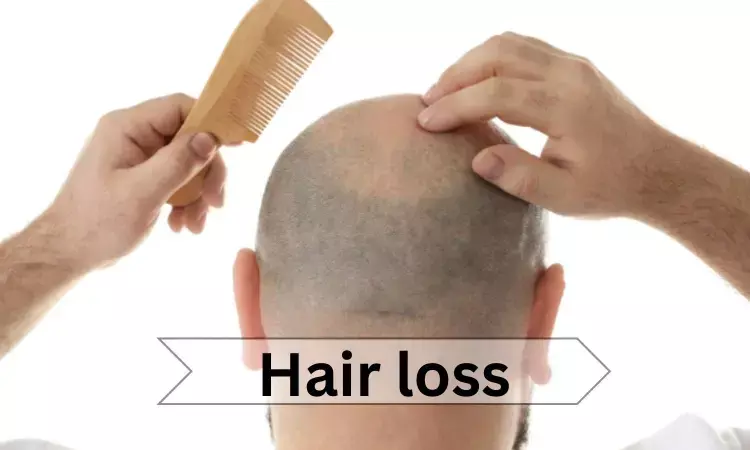- Home
- Medical news & Guidelines
- Anesthesiology
- Cardiology and CTVS
- Critical Care
- Dentistry
- Dermatology
- Diabetes and Endocrinology
- ENT
- Gastroenterology
- Medicine
- Nephrology
- Neurology
- Obstretics-Gynaecology
- Oncology
- Ophthalmology
- Orthopaedics
- Pediatrics-Neonatology
- Psychiatry
- Pulmonology
- Radiology
- Surgery
- Urology
- Laboratory Medicine
- Diet
- Nursing
- Paramedical
- Physiotherapy
- Health news
- Fact Check
- Bone Health Fact Check
- Brain Health Fact Check
- Cancer Related Fact Check
- Child Care Fact Check
- Dental and oral health fact check
- Diabetes and metabolic health fact check
- Diet and Nutrition Fact Check
- Eye and ENT Care Fact Check
- Fitness fact check
- Gut health fact check
- Heart health fact check
- Kidney health fact check
- Medical education fact check
- Men's health fact check
- Respiratory fact check
- Skin and hair care fact check
- Vaccine and Immunization fact check
- Women's health fact check
- AYUSH
- State News
- Andaman and Nicobar Islands
- Andhra Pradesh
- Arunachal Pradesh
- Assam
- Bihar
- Chandigarh
- Chattisgarh
- Dadra and Nagar Haveli
- Daman and Diu
- Delhi
- Goa
- Gujarat
- Haryana
- Himachal Pradesh
- Jammu & Kashmir
- Jharkhand
- Karnataka
- Kerala
- Ladakh
- Lakshadweep
- Madhya Pradesh
- Maharashtra
- Manipur
- Meghalaya
- Mizoram
- Nagaland
- Odisha
- Puducherry
- Punjab
- Rajasthan
- Sikkim
- Tamil Nadu
- Telangana
- Tripura
- Uttar Pradesh
- Uttrakhand
- West Bengal
- Medical Education
- Industry
Long-term therapy Baricitinib improves hair growth in severe alopecia areata

A new study published in the American Journal of Clinical Dermatology suggests that Baricitinib's effectiveness for treating people with severe alopecia areata (AA) increased over the course of 52 weeks, suggesting that long-term therapy may be required to see the most therapeutic benefit.
An autoimmune condition known as alopecia areata results in patchy hair loss on the face, scalp, and body. Baricitinib, an oral JAK inhibitor, has been effective for treating severe alopecia areata over a period of 36 weeks. On the longer-term management of AA, there is less information. For this reason, 52 weeks of continuous treatment in two phase III studies were used to examine the effectiveness and safety of baricitinib for AA in people with less than 50% scalp hair loss (BRAVE-AA1 and BRAVE-AA2).
Participants in BRAVE-AA1 (N = 465) and BRAVE-AA2 (N = 390) who were initially randomized to receive baricitinib continued to receive it until Week 52. The percentage of patients who achieved a Severity of Alopecia Tool (SALT) score under 20 (less than 20% scalp hair loss) was one measure of efficacy. Due to the coronavirus disease 2019 (COVID-19) pandemic, data were suppressed after permanent treatment termination or if gathered remotely.
The key findings of this study were:
During the course of the 52-week period, response rates for hair regrowth rose.
In Week 52, 40.9% and 21.2% of patients receiving baricitinib 4 mg and 2 mg, respectively, and 36.8% and 24.4% of patients receiving BRAVE-AA2 treatment, respectively, had a SALT score of 20 or below.
Upper respiratory tract infection, urinary tract infection, nasopharyngitis, headache, acne, creatine phosphokinase elevation, and COVID-19 infection were the most common treatment-emergent side events.
Long-term therapy outcomes show that hair regrowth for people with severe AA receiving baricitinib continues to improve without any new safety concerns. There were no more warning signs.
Reference:
Kwon, O., Senna, M. M., Sinclair, R., Ito, T., Dutronc, Y., Lin, C.-Y., Yu, G., Chiasserini, C., McCollam, J., Wu, W.-S., & King, B. (2023). Efficacy and Safety of Baricitinib in Patients with Severe Alopecia Areata over 52 Weeks of Continuous Therapy in Two Phase III Trials (BRAVE-AA1 and BRAVE-AA2). In American Journal of Clinical Dermatology. Springer Science and Business Media LLC. https://doi.org/10.1007/s40257-023-00764-w
Neuroscience Masters graduate
Jacinthlyn Sylvia, a Neuroscience Master's graduate from Chennai has worked extensively in deciphering the neurobiology of cognition and motor control in aging. She also has spread-out exposure to Neurosurgery from her Bachelor’s. She is currently involved in active Neuro-Oncology research. She is an upcoming neuroscientist with a fiery passion for writing. Her news cover at Medical Dialogues feature recent discoveries and updates from the healthcare and biomedical research fields. She can be reached at editorial@medicaldialogues.in
Dr Kamal Kant Kohli-MBBS, DTCD- a chest specialist with more than 30 years of practice and a flair for writing clinical articles, Dr Kamal Kant Kohli joined Medical Dialogues as a Chief Editor of Medical News. Besides writing articles, as an editor, he proofreads and verifies all the medical content published on Medical Dialogues including those coming from journals, studies,medical conferences,guidelines etc. Email: drkohli@medicaldialogues.in. Contact no. 011-43720751


